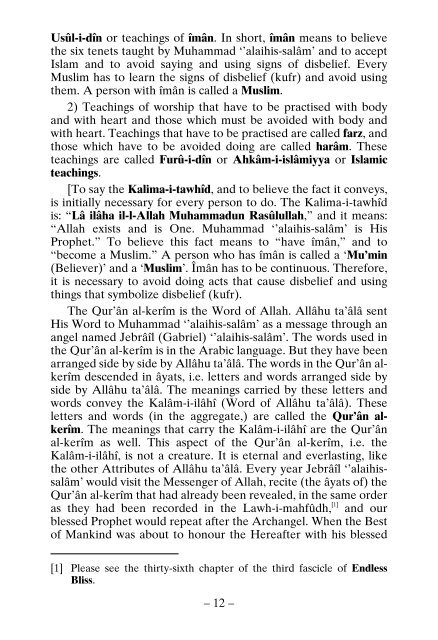Belief and Islam
BELIEF AND ISLAM star This work, Belief and Islam, originally was written in Persian under the title I’tiqâd-nâma by Hadrât Mawlânâ Khâlid al-Baghdâdî, a profound ‘âlim of Islam and a specialist in ma’ârif of tasawwuf. Hâji Faydullah Effendi of Kemah, a khalîfa of great walî Mavlânâ Mahmûd Sâhib, the brother of the author, translated the book into Turkish and named it Farâid-ul-fawâid which was printed in Istanbul in 1312 A.H.[1894]. Our bookstore had it translated again from the Persian original into Turkish and, some explanations and three chapters, published it with the title Imân ve Islâm in 1966. German, French and Arabic versions are also published by our bookstore. This book, explains five fundamentals of Islam, six fundamentals of îmân and the contemporary information about the matter and refutes those who are against Islam and those who are lâ-madbhabî.
BELIEF AND ISLAM
star This work, Belief and Islam, originally was written in Persian under the title I’tiqâd-nâma by Hadrât Mawlânâ Khâlid al-Baghdâdî, a profound ‘âlim of Islam and a specialist in ma’ârif of tasawwuf. Hâji Faydullah Effendi of Kemah, a khalîfa of great walî Mavlânâ Mahmûd Sâhib, the brother of the author, translated the book into Turkish and named it Farâid-ul-fawâid which was printed in Istanbul in 1312 A.H.[1894]. Our bookstore had it translated again from the Persian original into Turkish and, some explanations and three chapters, published it with the title Imân ve Islâm in 1966. German, French and Arabic versions are also published by our bookstore. This book, explains five fundamentals of Islam, six fundamentals of îmân and the contemporary information about the matter and refutes those who are against Islam and those who are lâ-madbhabî.
You also want an ePaper? Increase the reach of your titles
YUMPU automatically turns print PDFs into web optimized ePapers that Google loves.
Usûl-i-dîn or teachings of îmân. In short, îmân means to believe<br />
the six tenets taught by Muhammad ‘’alaihis-salâm’ <strong>and</strong> to accept<br />
<strong>Islam</strong> <strong>and</strong> to avoid saying <strong>and</strong> using signs of disbelief. Every<br />
Muslim has to learn the signs of disbelief (kufr) <strong>and</strong> avoid using<br />
them. A person with îmân is called a Muslim.<br />
2) Teachings of worship that have to be practised with body<br />
<strong>and</strong> with heart <strong>and</strong> those which must be avoided with body <strong>and</strong><br />
with heart. Teachings that have to be practised are called farz, <strong>and</strong><br />
those which have to be avoided doing are called harâm. These<br />
teachings are called Furû-i-dîn or Ahkâm-i-islâmiyya or <strong>Islam</strong>ic<br />
teachings.<br />
[To say the Kalima-i-tawhîd, <strong>and</strong> to believe the fact it conveys,<br />
is initially necessary for every person to do. The Kalima-i-tawhîd<br />
is: “Lâ ilâha il-l-Allah Muhammadun Rasûlullah,” <strong>and</strong> it means:<br />
“Allah exists <strong>and</strong> is One. Muhammad ‘’alaihis-salâm’ is His<br />
Prophet.” To believe this fact means to “have îmân,” <strong>and</strong> to<br />
“become a Muslim.” A person who has îmân is called a ‘Mu’min<br />
(Believer)’ <strong>and</strong> a ‘Muslim’. Îmân has to be continuous. Therefore,<br />
it is necessary to avoid doing acts that cause disbelief <strong>and</strong> using<br />
things that symbolize disbelief (kufr).<br />
The Qur’ân al-kerîm is the Word of Allah. Allâhu ta’âlâ sent<br />
His Word to Muhammad ‘’alaihis-salâm’ as a message through an<br />
angel named Jebrâîl (Gabriel) ‘’alaihis-salâm’. The words used in<br />
the Qur’ân al-kerîm is in the Arabic language. But they have been<br />
arranged side by side by Allâhu ta’âlâ. The words in the Qur’ân alkerîm<br />
descended in âyats, i.e. letters <strong>and</strong> words arranged side by<br />
side by Allâhu ta’âlâ. The meanings carried by these letters <strong>and</strong><br />
words convey the Kalâm-i-ilâhî (Word of Allâhu ta’âlâ). These<br />
letters <strong>and</strong> words (in the aggregate,) are called the Qur’ân alkerîm.<br />
The meanings that carry the Kalâm-i-ilâhî are the Qur’ân<br />
al-kerîm as well. This aspect of the Qur’ân al-kerîm, i.e. the<br />
Kalâm-i-ilâhî, is not a creature. It is eternal <strong>and</strong> everlasting, like<br />
the other Attributes of Allâhu ta’âlâ. Every year Jebrâîl ‘’alaihissalâm’<br />
would visit the Messenger of Allah, recite (the âyats of) the<br />
Qur’ân al-kerîm that had already been revealed, in the same order<br />
as they had been recorded in the Lawh-i-mahfûdh, [1]<br />
<strong>and</strong> our<br />
blessed Prophet would repeat after the Archangel. When the Best<br />
of Mankind was about to honour the Hereafter with his blessed<br />
[1] Please see the thirty-sixth chapter of the third fascicle of Endless<br />
Bliss.<br />
– 12 –

















